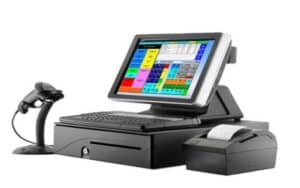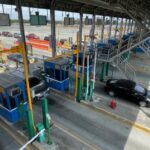You should utilize all the resources available for your organization, including a dependable point of sale system.
With this system in place, you’ll benefit from smooth transactions and have a better chance of standing out in the cutthroat business environment of today. Brands without POS systems could lose out on a lot of business prospects, cost savings, and customer service improvement potential.
Continue reading if you want to learn more about POS systems and how they can simplify your business operations.
Please read: Selecting a Philippine City to Launch a Business
What is POS?
A point of sale, or POS, system enables your company to simultaneously receive payments from customers and manage sales. These two advantages might sound simple, but how they are implemented will depend on whether you operate a physical store, an internet company, or both.
You can have a POS terminal and system that will be used to handle payments for real stores. The POS might be a cloud-based platform for internet shops. A POS system is similar to having an improved cash register in many aspects. And how does it operate?
A customer must first determine whether to purchase your good or service. When making an online purchase, the customer can simply add things to their cart and continue to the checkout if you have a real location where they can ask your personnel to ring up their bill.
The total of their bill, including the sales tax, will then be determined by your POS system. Your inventory will then be updated to reflect the things that have been sold.
The customer can now complete their transaction by paying with cash, rewards points, a credit card, a gift card, a virtual pay card, or another cashless way. The transaction is now complete. You either hand the customer their order or mail it to them after receiving the payment and creating a receipt. At this point, the sale is formally completed.
The customer’s information is then saved and used to provide them with customized newsletters and adverts. You can forecast trends with the help of all the data in your POS system.
Three Parts of POS System
Three components make up a POS system:
- Software
- Hardware
- Payments
Software
The operating system used to handle your store, items, clients, and personnel is known as POS software.
The majority of point-of-sale software vendors give a variety of subscription plans at various price points. The more expensive plans frequently come with more sophisticated features, even while the lower affordable ones provide all you need to sell in-person.
Online shopping POS, for example, offers unified multi-channel sales data, customer purchase histories, inventory management, order fulfillment, and more for retailers who sell both online and offline.
Hardware
You require POS gear in order to accept payments. Ensure that the POS system you select can accept all payment methods, including cash, gift cards, credit and debit cards, mobile payments like Apple Pay or Google Pay, and cash.
You will require a cash register, tap and chip card reader, cash drawer, and bar-code scanner, depending on the payment methods your POS system will take.
Payments
Additionally, POS systems handle transferring money from each sale to your bank account. However, if the POS system has integrated payment processing, you can manage both in-store and online sales and payments from the same back office, save paying third-party payment processing fees, and know when to anticipate payouts.
Benefits & Features of POS
Here are some of the most crucial aspects you need to consider when choosing a POS system.
Processing of orders and billing
The most fundamental tasks of your POS system are billing and order processing. By reading the barcodes of the objects, it should be able to charge orders and record different payment methods.
A decent POS system should also create an invoice that includes the order information.
Monitoring and reporting
Detailed monitoring and reporting are two of your POS system’s most crucial components. It must produce a sales report every week, day, month, or year. This will help you determine whether your firm is successful or not. In addition, it will enable you to forecast sales patterns and obtain useful insight.
Savvy inventory control
Controlling inventory is essential. However, it might be difficult to guarantee stock quantities are accurate when you sell both online and offline because things are constantly being received, sold, returned, or exchanged.
The best point-of-sale (POS) systems integrate with your e-commerce platform to make sure that the stock numbers customers see online and the stock levels personnel view in the POS system accurately reflect the goods you actually have on hand.
Multi-store administration
You can manage several stores using a single piece of software with many POS systems. Franchisees, corporate networks, and other buying organizations stand to gain significantly from this.
With the help of this functionality, you can effortlessly tailor each store to meet its requirements and administer it on a single platform. As a result, far less work will be required.
Customer Relations
You’ll be astonished at how much a top-notch POS system can do to enhance client connections and experiences by saving information about past purchases. When it comes to advertising, this crucial information may be leveraged to provide your devoted clients with a tailored experience.
Cross channel management
If you have a solid POS system, facilitating refunds and returns won’t be a headache any longer. The specifics of the return or refund, including the total amount, the client’s and salesperson’s names, as well as any additional comments, must be captured by your system.
When is a POS system necessary?
A retail POS system is required if you wish to track sales, receive payments in person, and manage inventory.
While you could manually enter each sale into a spreadsheet, doing so would make it much more difficult to comprehend your sales accurately and manage your inventory. After all, how can you make wise selections if your knowledge is incomplete?
Modern POS systems take care of everything and guarantee the accuracy of your sales and inventory data. They automatically record each sale and maintain track of vital product details including the product’s wholesale price, retail price, gross profit margin, and so on. Every time you purchase, sell, return, or exchange a product in-person or online, inventory levels and sales information are updated.
The reports and analytics you use to better understand your business and make confident decisions are fed by all that point-of-sale data.
Philippines’ Top POS Providers
- Maya
- Maya Terminal Lite
- BDO miniPOS
- Shopify POS
- Globe Cloud POS
- GCash QR
- Imonggo
Conclusion
You wouldn’t want to fall behind the competition by using manual and antiquated technologies in the different industries, which is changing at an accelerated rate. It’s time to appreciate the value of POS systems and to think about upgrading your business.
Visit the ALLCASH website for the most current and informative blogs available.





